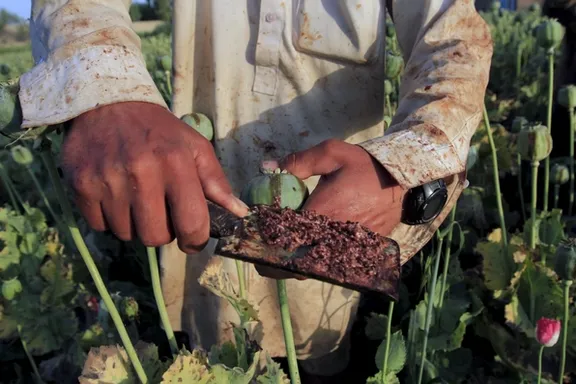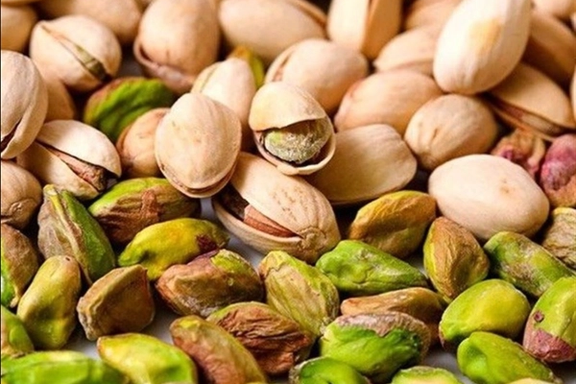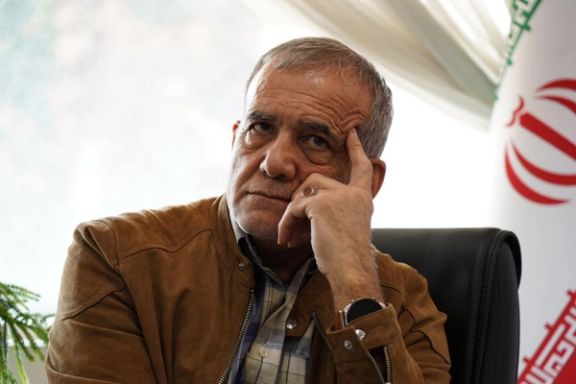Iran warns of harsh penalties for illegal poppy cultivation

Iran’s anti-narcotics authority warned on Monday that poppy cultivation would face severe punishment, including fines, prison and land confiscation for repeat offenders.

Iran’s anti-narcotics authority warned on Monday that poppy cultivation would face severe punishment, including fines, prison and land confiscation for repeat offenders.
Tarahomi, head of legal affairs at the Anti-Narcotics Headquarters, told state media that speculation about legalizing poppy cultivation was misplaced. “What is under consideration is licensing controlled cultivation of certain poppy species such as Papaver bracteatum -- also known as the Iranian poppy -- for medical use, not opium poppy,” he said.
He explained that Iran had voluntarily halted poppy farming after the 1979 revolution, meeting pharmaceutical needs through seizures and imports. But declining production in Afghanistan has forced Tehran to consider limited licensed cultivation for morphine and related medicines under international conventions.
Tarahomi said licensed crops would be grown only on enclosed land with state purchase and factory processing, leaving no possibility of diversion. By contrast, he warned, illegal growers would face escalating penalties: “The first time a fine, the second time a fine and prison, and from the third time onward, fine, prison and confiscation of agricultural land.”
Officials have previously reported a sharp fall in opium seizures and rising concerns over illegal cultivation in some provinces, with authorities destroying thousands of hectares of illicit fields.

Iran’s judiciary chief warned on Monday that those undermining public morale amid renewed international sanctions would face legal action, accusing them of aiding hostile powers.
“For nearly half a century, the front of arrogance has employed every kind of conspiracy and enmity against the Iranian nation and the Islamic Republic,” Gholamhossein Mohseni-Ejei told the Supreme Judicial Council, using a phrase Iranian authorities employ to refer to Western powers.
He said economic siege was “nothing new” for Iranians, adding: “At this time, when enemies are focusing all efforts to bring down the Iranian nation and system, we must be vigilant that their agents do not infiltrate and damage national unity.”
“Those who through psychological operations weaken people’s spirit and spread fear will face legal measures,” he said, warning that profiteers or individuals disrupting essential goods markets “whether out of greed, negligence, or acting as enemy agents, will be dealt with decisively under the law.”
Earlier this month, Iran’s prosecutor general’s office warned that media and online outlets would also face legal action if their coverage of the reimposed UN sanctions undermines public morale.
Judiciary’s news outlet Mizan said some websites and channels had posted “sensitive content” about rising prices, adding that such reporting threatened the “psychological security of society.”
The judiciary has previously pursued cases against journalists and citizens over commentary on political and economic issues.

The European Union on Monday reimposed sweeping sanctions on Iran’s nuclear and ballistic programs after the return of United Nations restrictions under the snapback mechanism, reinstating bans on trade, finance, transport and energy first lifted in 2015.
“Today, the Council agreed to reimpose a number of restrictive measures in relation to Iran's nuclear proliferation activities, that had then been suspended with the entry into force of the Joint Plan of Action (JCPOA or Iran nuclear deal) in 2015,” the Council of the EU said in a press release.
The decision followed the reintroduction of UN sanctions after the Security Council declined to extend relief, triggered on August 28 when France, Germany and the United Kingdom (the E3) said Iran was in “significant non-performance” of its commitments.
The Council said the measures include both UN Security Council sanctions adopted since 2006 and EU autonomous measures. They cover:
- Travel bans and asset freezes for listed individuals and entities, and a prohibition on providing funds or economic resources.
- Economic and financial sanctions, spanning trade, banking and transport.
- Trade restrictions, including bans on imports and transport of Iranian crude oil, natural gas, petrochemical and petroleum products; the sale of energy equipment, gold, precious metals, diamonds, certain naval equipment and software.
- Financial sector measures, including freezing assets of the Central Bank of Iran and major commercial banks.
- Transport restrictions, reinstating measures to bar Iranian cargo flights from EU airports and prohibit maintenance or servicing of Iranian cargo aircraft or vessels carrying prohibited materials.
The Council stressed these steps followed earlier commitments. “In October 2015 the Council adopted declaration 2015/C 345/01 lifting all EU nuclear-related sanctions in accordance with the JCPOA and stressing that the EU would reintroduce sanctions in case of significant non-performance by Iran,” it said.
E3 says Iran left no choice
On Sunday, the E3 foreign ministers said Tehran’s breaches had left no alternative. “We welcome the re-instatement since 20:00 EDT on 27 September of Resolutions 1696, 1737, 1747, 1803, 1835, and 1929 after completion of the snapback process,” they said. “We urge Iran and all states to abide fully by these resolutions.”
The ministers accused Iran of “exceeding all limits on its nuclear program” since 2019, noting it held enriched uranium “48 times the JCPOA limit” and at least 10 significant quantities of highly enriched uranium outside of monitoring. “Iran has no credible civilian justification whatsoever for its HEU stockpile,” they said.
They insisted diplomacy remained possible. “The reimposition of UN sanctions is not the end of diplomacy. We urge Iran to refrain from any escalatory action and to return to compliance with its legally binding safeguards obligations.”
Tehran says no obligation to comply
Iran rejected the move outright. “The Islamic Republic of Iran rejects the claim of the three European countries and the United States regarding the return of previous resolutions that ended under Resolution 2231 in 2015, and emphasizes that no obligation is created for UN member states, including Iran,” the foreign ministry said in a statement on Sunday.
It added: “Any attempt to revive terminated resolutions is legally baseless, morally unacceptable and logically flawed.”
Foreign Minister Abbas Araghchi separately wrote to UN Secretary-General Antonio Guterres and Security Council President Sang Jin Kim, saying the alleged return of sanctions was “null and void.”
He urged them “to prevent any attempt to revive the sanctions mechanisms, including the Sanctions Committee and the Panel of Experts.”
Araghchi accused the Europeans of “defaulting on their commitments, misusing the JCPOA dispute settlement process, and even justifying military attacks against safeguarded nuclear facilities in Iran.”
Tehran said all nuclear-related restrictions under Resolution 2231 must expire on October 18, 2025. “Iran will not recognize any effort to extend, revive or enforce them after that,” the ministry said.

Canada’s food safety watchdog has temporarily banned imports of pistachios and pistachio products from Iran after more than 100 confirmed salmonella cases and several recalls linked to contaminated shipments.
The Canadian Food Inspection Agency (CFIA) said the move was "a precautionary measure to protect Canadians from the risk of Salmonella infection.”
Importers must now prove shipments do not originate from Iran, or they will be blocked or sent for testing.
“An outbreak investigation is ongoing, led by the Public Health Agency of Canada, with more than 100 laboratory-confirmed Salmonella infections in Canada and numerous food recall notifications linked to pistachio kernels and products originating from Iran,” read a statement by CFIA.
At least 16 people have been hospitalized, though no deaths have been reported. The Public Health Agency of Canada said 75% of cases were among women, warning that children, the elderly and pregnant women are particularly vulnerable.
The CFIA said the restrictions will remain in place until food safety reviews are complete, with penalties ranging from fines to license suspensions or legal action for violations.
Iranian pistachios have faced bans in the past.
Last year, the European Union temporarily halted imports after detecting high levels of aflatoxin, a toxic mold byproduct.
Other Iranian produce, including peppers, kiwis and potatoes, has also been rejected by Russia, India and Pakistan in recent years over contamination concerns.

Iran will enter a war with the United States if Israel launches a new attack on the Islamic Republic, a senior Iranian official and former chief commander of the Revolutionary Guard said on Sunday.
"The Zionists (Israel) are seeking to try their luck against Iran once again," Major General Mohsen Rezaei told the state TV.
“However, events will soon happen inside Israel that will make this impossible,” he said. “It is not expedient to talk about them now.”
His remarks came hours after Ynet reported Israel is on heightened alert after the United Nations sanctions were reinstated on Iran under the so-called snapback mechanism, amid fears in the Jewish State that Tehran could accelerate its nuclear activities.
The sanctions were imposed despite several rounds of talks between Tehran and world powers aimed at clinching an agreement on Tehran’s disputed nuclear program.
Rezaei said Tehran will not accept further negotiations with Western powers that give Israel time to prepare or strengthen its position.
“Negotiations aimed at giving Israel time or strengthen it are unacceptable,” the veteran general-turned-politician told the state TV as he was once again seen wearing his military uniform.
“If that happens, the moment Israel starts a war, we will also enter a war with the United States,” said Rezaei who is a member of Iran’s Expediency Council.
“Negotiations must not be accepted in any form, at any price, or without conditions,” he said. “If we enter negotiations, military force must in no way be used against Iran. Otherwise, we will retaliate; not only against Israel, but also against American targets in the region.”
The warning followed fresh statements from Iran’s military leadership emphasizing the country’s readiness to respond to any attack.
Earlier on Sunday, Iran’s armed forces chief of staff Abdolrahim Mousavi said the military is fully prepared to respond to any threat or assault.
“Unity between the army and the Revolutionary Guards is the guarantor of preserving Iran’s territorial integrity,” Mousavi said during a meeting with the Guards’ commander.
“The armed forces are fully ready to confront any threat or possible aggression with strength,” he added.

The reimposition of UN sanctions on Iran, atop the US sanctions President Masoud Pezeshkian had pledged to lift during his election campaign, has disillusioned many of his moderate supporters and prompted hardliners to call for his resignation.
Pezeshkian, who left New York on Saturday empty-handed after failing to secure a deal with European powers, said the United States demanded Iran surrender its stock of highly enriched uranium in exchange for only 90 days of relief from UN sanctions.
“If we are to choose between the unreasonable demands of the Americans and the snapback, our choice is the snapback,” Pezeshkian said, hours before the return of UN sanctions.
Kamran Matin, professor of international relations at the University of Sussex, told Iran International that Iran’s leaders knew negotiations would not succeed because halting enrichment and surrendering the highly enriched uranium stockpiles would have meant “total surrender”—something that would have endangered the Islamic Republic’ cohesion.
US-based commentator Ali Afshari argued that the responsibility went beyond Pezeshkian, stressing that presidents do not determine Iran’s strategic policies.
“Those who peddled illusions in the 2024 presidential ‘quasi-election’ cannot hold only Masoud Pezeshkian responsible for the return of UN sanctions and the war,” he wrote on X, adding that reformists had misled voters by urging participation.
Hardliners claim vindication
The snapback of UN sanctions has emboldened Pezeshkian’s conservative rivals who staunchly opposed the 2015 nuclear deal.
After the UN vote, his hardline election rival Saeed Jalili wrote on X: “In 2015 they said JCPOA would completely lift sanctions but almost nothing (happened). Ten years of a nation’s life was wasted because of this political behavior.”
Ultra-hardline lawmaker Amirhossein Sabeti, a close ally of Jalili, echoed his remarks: the JCPOA “was a colonial and one-sided agreement that wasted ten years of the nation’s life, restricted Iran’s nuclear infrastructure, and ultimately, by proving the wisdom of the revolutionary camp that opposed it from the beginning, exposed the illusions of the pro-West faction.”
On social media, ultra-hardline users demanded prosecutions. One wrote: “The end of the disgraceful JCPOA—the greatest shame in the history of Iran’s politics—congratulations to patriotic compatriots and those who care for Iran, and condolences to reformists, centrists, moderates, and all traitors to the homeland. It is time that those responsible for this disgraceful agreement be put on trial for this unforgivable betrayal.”
Some voices in the reformist camp lamented the collapse. Azar Mansouri, head of the Reform Front, accused conservatives of political score-settling.
“They fought it for years and now celebrate its death. But returning to the pre-JCPOA era means sanctions, isolation, and more pressure on the people. What is there to celebrate?”
Disillusionment with Pezeshkian
Frustration has increasingly turned toward the president. One user recalled his campaign pledge: “Pezeshkian had promised that if he failed to achieve his goals, including lifting sanctions, he would resign. Why didn’t he rely on popular mobilization to achieve his aims? Why doesn’t he resign now?”
Others mocked his unkept promises. “From the beginning, pinning hopes on Pezeshkian to lift sanctions was wishful thinking,” one activist wrote. “Someone who couldn’t deliver on his promise of lifting internet filtering after a year cannot be expected to deliver on lifting sanctions… He had also promised to resign if his pledges were not fulfilled.”
Journalist Mohammad Aghazadeh faulted reformists for urging turnout: “They frightened us by saying if Jalili won, the JCPOA would collapse, and war would break out. Pezeshkian was elected, but sanctions returned, and war came too—and will come again.”
Activist Hossein Razzagh, who boycotted the election, wrote: “The only thing Pezeshkian is not committed to is the votes of those he lured to the ballot box with promises of lifting the shadow of war. The only thing he is committed to is the Leader!”
Journalist Ahmad Zeidabadi urged Pezeshkian to level with voters: “Most of the decisive factors lie beyond his control. But he must frankly explain to the people what his plan is… In fact, he entered the second round of the presidential election with the aim of saving us from Saeed Jalili’s program. Now he is compelled to play Mr. Jalili’s role himself!”
Political activist Motahereh Gounei summed up the wider sense of betrayal: “You celebrated that Jalili didn’t come and Pezeshkian did! The country was ruined, its resources and infrastructure destroyed, we got both war and negotiations!"
"Sanctions returned, the dollar reached 110,000 tomans, and now I, a young Iranian, am awaiting a prison sentence simply for writing about Khamenei’s incompetence in governance and policymaking," the activist said.